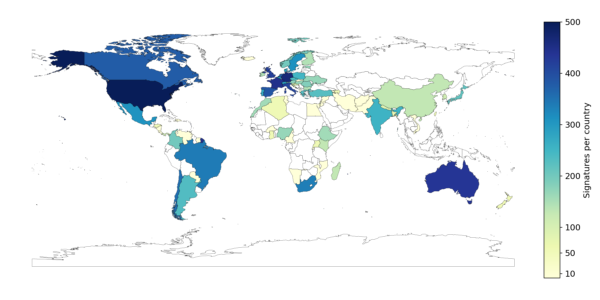P R E S S R E L E A S E
European Astronomical Society (EAS)
——————————————————————————
1 July 2021
‘There is No Planet B’ — 2,750 astronomers worldwide demand climate action
More than 2,750 professional astronomers from 87 countries have signed an open letter released on Earth Day, 2021, recognizing that there is no ‘Planet B.’ They call for astronomical departments, institutions, and societies to adopt sustainability as a primary goal, and to communicate this widely to their constituents and the public. Several astronomical institutions have already endorsed the letter, signaling their support for the stated goals. This was announced at the annual meeting of the European Astronomical Society (EAS), hosted by Leiden University, the Netherlands.
The initiative is led by Astronomers for Planet Earth (A4E), a global volunteer network of astronomers, astronomy students, and astronomy educators committed to addressing the climate crisis and calling for climate justice.
In the letter, astronomers acknowledge the urgency of the climate crisis and the impact that the field of astronomy has on it—and assert that the community has the power to change its current practices for the better. Signatories call on astronomical institutions to take a leading position in mitigating the contribution of astronomy to the climate crisis and communicating widely that this is a priority. The letter requests three actions of all astronomical institutions, including local research institutes, university departments, national and international astronomical societies, and unions:
- Name sustainability as a primary goal,
- Put in place specific sustainable practices to lower carbon emissions,
- Clearly communicate these changes to both institute members and the public.
“As astronomers, we are making decisions every day that can either slow or accelerate an irreversible global rise in temperature, in the way we run our codes, travel for conferences, and operate our telescopes,” states Gabriele Betancourt-Martinez, an A4E member who coordinated the open letter project. “There are many ways for us to reduce our dependence on fossil fuels, thereby lowering our impact on the climate crisis and protecting our ability to carry out research. But we need to act now, and we need to act together. By working with the institutions and societies of which we are constituents as a global community of astronomers to take collective action, we’ll have a greater positive impact on the climate, and send a stronger message out into the world.”
One of the tenets of A4E is that astronomy provides a unique position to understand and communicate the impact of the climate crisis. Astronomers have discovered more than 4000 exoplanets to date, but none of them serve as an alternative to Earth; there is no ‘Planet B.’
“If we are talking about exoplanets, things should be clear: we will not migrate there. These planets are much, much too far away,” says Nobel laureate Michel Mayor, one of the discoverers of the first exoplanet around a sun-like star. “Even in the very optimistic case of a liveable planet that is not too far, say a few dozen light years […] the time to go there is considerable. We are talking about hundreds of millions of days using the means we have available today. We must take care of our planet; it is very beautiful and still absolutely liveable.”
Alongside Michel Mayor and his co-laureate Didier Queloz, several directors of astronomical institutes, observatories and societies have signed the letter, and it has currently been endorsed by nine astronomical institutes. Eighty-seven countries are represented by the >2750 signatures of verified professional astronomers and astronomy educators listed on the open letter. This equates to the equivalent of ~24% of the International Astronomical Union’s membership.
“The climate crisis is a problem that impacts everyone, everywhere. The field of astronomy is no different and must take action to reduce its carbon footprint,” indicates the Astronomical Society of the Pacific (ASP), one of the endorsers of the letter. “The A4E Open Letter, with its >2750 signatories, sends a powerful message that astronomers around the world want their host institutions and organizations to prioritize addressing the climate crisis.”
A4E believes that an important part of astronomy is that it provides society with the ability to view Earth as a whole. It is an understanding that can be used as a foundation to drive change, and one that A4E would like to see as a core part of astronomers’ approach to research, decision making, and action in a more sustainable future.
The open letter, which is still open for signatures, can be accessed here: https://astronomersforplanet.earth/open-letter

——————————————————————————
More information:
About A4E
Astronomers for Planet Earth is a volunteer network of astronomers, astronomy students, and astronomy educators committed to bringing our voices to the fight against the climate crisis and for climate justice. The organization grew out of groups that formed independently in 2019, one in North America and one in Europe.
The 1200+ members of Astronomers for Planet Earth hail from 78 countries.
Members of A4E were recently involved in a special ‘Climate Issue’ of Nature Astronomy. The issue considers the emissions of different institutes and observing techniques, and can be accessed in full here: https://www.nature.com/natastron/volumes/4/issues/9
A4E website: https://astronomersforplanet.earth/
Open Letter Endorsements
The letter has already been endorsed by the institutions listed below. More endorsements are anticipated. Updates are being posted on our website at https://astronomersforplane`t.earth/open-letter.
- Leiden Observatory (The Netherlands)
- Royal Netherlands Astronomical Society (The Netherlands)
- Astronomical Society of the Pacific (United States)
About the EAS
The European Astronomical Society (EAS) promotes and advances astronomy in Europe. As an independent body, the EAS is able to act on matters that need to be handled at a European level on behalf of the European astronomical community. In its endeavours the EAS collaborates with affiliated national astronomical societies and also with pan-European research organisations and networks. Founded in 1990, the EAS is a society of individual members. All astronomers may join the society, irrespective of their field of research, or their country of work or origin. In addition, corporations, publishers and non-profit organisations can become organizational members of the EAS. The EAS, together with one of its affiliated societies, organises the annual EAS meeting to enhance its links with national communities, to broaden connections between individual members and to promote European networks.
Follow #EASLeiden2021 on Twitter and Facebook
——————————————————————————
